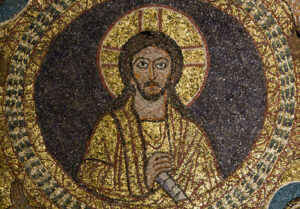Clement of Alexandria gives quintessential expression to this view. In “Who Is the Rich Man Who Shall Be Saved?,” he argues that money is merely an instrument, a passive object that doesn’t have its own moral value. So long as it’s subservient to us and not us to it, individual wealth can be good for all, as it provides its holder with the resources to “give food to the hungry, and drink to the thirsty, clothe the naked, and shelter the houseless.” Otherwise put, when one’s desire with respect to money is shaped properly—that is, formed by and directed toward God—the use money can take on the hue of grace.
If the goal is assimilation to society, to its demands, then finding a place for individual wealth—justifying it theologically, both in theory and practice—makes sense. Wealth is power and power is wealth, and if any institution, including religious institutions, wants to be on the right side of the state, it must ultimately support such a view, making space literally and metaphorically for wealth to flourish. Individual wealth, then, becomes good—in fact, necessary—for the overall well-being of the polis, which religious institutions often prop up in various ways, but often at the individual level by enjoining charity.
Charity may certainly be of limited help to individuals, but any help it provides always takes place within a larger system that assumes the inequitable distribution of resources and access to them. Charity assumes what theologian José Porfirio Miranda calls “differentiating wealth,” that is, the sort of wealth that unjustly accrues to some against others. Differentiating wealth divides society along the lines of rich and poor, deserving and undeserving, saved and damned.
Miranda argues that, ultimately, there is no legitimate, moral way to amass such wealth, even if it passes the threshold of legality: somewhere along the line it depends directly or indirectly on the impoverishment of others. To use a personal example, my salary may not directly rely on the mass exploitation of what’s euphemistically known as “outsourced labor,” at least as far as I know. It does, however, rely on the depressed wages of support staff and adjunct labor, among others and other things—and that’s not even to take into account the fact that a good portion it goes to various goods produced in a global supply chain that does depend on structural inequity and oppression.
It’s easy to knock billionaires and multimillionaires as exemplars of greed and a system gone wrong, and I agree: a political-economic formation that allows them to emerge in the first place relative to widespread lack is inherently unjust. But we all also participate in that system, even if some of the actors are more guilty than others and, as such, more worthy of our collective ire. We shouldn’t, however, use that as an excuse to ignore the more widespread and sometimes subtle ways that differentiating wealth works, effectively blinding us to our responsibilities to and for each other in an unjust economic system.
Jesus’ parable of the rich man and Lazarus (Luke 16:19-31) is instructive here. While the rich man in the parable dwells comfortably in his house all day, all his needs met, a poor man named Lazarus sits sick and hungry outside the house’s gate. Both eventually die, but their respective post-mortem destinations reverse their earthly lots: Lazarus is “carried away by the angels to be with Abraham” (Luke 16:23) while the rich man finds himself tormented in Hades. The rich man cries out for mercy but there is none to be had, since he knew via “Moses and the prophets” (Luke 16:29) his responsibilities to the poor man, to the poor in general. He has already received any “mercy” he may have thought he was due in his prior, earthly comfort.
What’s interesting about the parable is that the rich man doesn’t actually do anything wrong. He doesn’t intentionally withhold anything from the poor man, doesn’t actively oppress him or exploit his labor. Rather, his wealth blinds him to the poor man’s existence: he doesn’t even see the poor man and, thus, is simply guilty of ignoring him. The problem is that the economic differential between the rich man and the poor man prevents the former from acting justly with respect to the latter. Wealth itself is the problem, which means that the solution is not to be found merely in reshaping individual desire but a justice that redresses the economic differential.
This is roughly what Jesus means, I think, when he says “No slave can serve two masters; for a slave will either hate the one and love the other, or be devoted to the one and despise the other. You cannot serve God and wealth [mammon]” (Luke 16:13; cf. Matt 6:24). The normal way to read this parable is to blunt its force by placing God and mammon in a hierarchical relationship with each other. When Jesus says “You cannot serve God and mammon,” we hear something like “Serve God before mammon” or “Serve God with mammon.” That’s certainly how Clement of Alexandria understood the statement, as mentioned above, and it’s also I would argue how the main streams of the Christian theological and ecclesiastical traditions have as well.
For Jesus, however, the relationship between God and mammon is not one of priority but rather disjunction: it’s either God or mammon because one cannot serve both simultaneously. Differentiating wealth forces our hand toward mammon, whether we like it or not—whether we desire it or not. Those of us who benefit from an economic system that allows us to accrue relative wealth via and against others are the rich man in Jesus’ parable, as we have thrown in our lot with mammon, not God.
The difficulty of Jesus’ claims regarding wealth, regarding the disjunction between God and mammon, should not be an excuse for toning it down for the sake of easing our consciences; nor should it serve as an excuse for inaction. Rather it should incite us to think and act otherwise with respect to wealth and the economic system that makes its differentiation possible. Charity may be easier, but solidarity gets us closer to what Jesus meant. Certainly, he sets a high bar, but he also reminds us that it’s possible, so long as we align ourselves correctly with respect to the disjunction.
Hollis Phelps is Assistant Professor of Interdisciplinary Studies at Mercer University. His most recent book is Jesus and the Politics of Mammon published by Cascade Books.
Did you appreciate this article? Please consider making a donation to help us continue to build a new voice for the Christian Left. Click here to donate today.



